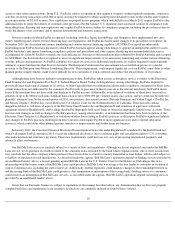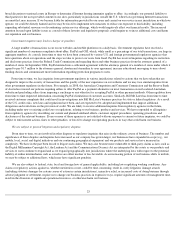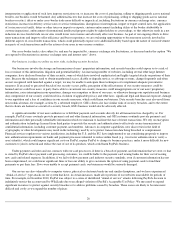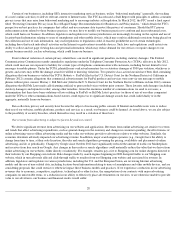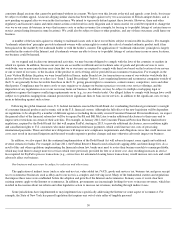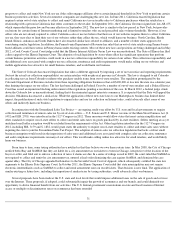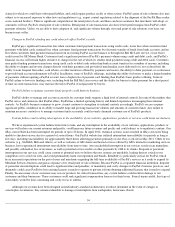eBay 2012 Annual Report Download - page 27
Download and view the complete annual report
Please find page 27 of the 2012 eBay annual report below. You can navigate through the pages in the report by either clicking on the pages listed below, or by using the keyword search tool below to find specific information within the annual report.
cards, the velocity of trade on eBay and websites operated by GSI's clients that accept PayPal as a form of payment could also decrease, in which
case our business would further suffer. The Bill Me Later service is similarly subject to the risk of fraudulent activity associated with merchants,
users of the Bill Me Later service and third parties handling its user information. Our Payments business has taken measures to detect and reduce
the risk of fraud, but these measures need to be continually improved and may not be effective against new and continually evolving forms of
fraud or in connection with new product offerings. If these measures do not succeed, our business will suffer.
eBay faces similar risks with respect to fraudulent activities on its websites. eBay periodically receives complaints from users who may not
have received the goods that they had purchased. In some cases, individuals have been arrested and convicted for fraudulent activities using our
websites. eBay also receives complaints from sellers who have not received payment for the goods that a buyer had contracted to purchase. Non-
payment may occur because of miscommunication, because a buyer has changed his or her mind and decided not to honor the contract to
purchase the item, or because the buyer bid on the item maliciously to harm either the seller or eBay. In some European and Asian jurisdictions,
buyers may also have the right to withdraw from a sale made by a professional seller within a specified time period. While eBay can, in some
cases, suspend the accounts of users who fail to fulfill their payment or delivery obligations to other users, eBay does not have the ability to
require users to make payment or deliver goods, or otherwise make users whole other than through its buyer protection program.
Our limited eBay and PayPal buyer protection programs represent the means by which we compensate users who believe that they have
been defrauded, have not received the item that they purchased, or have received an item different than what was described. However, users who
pay through PayPal may have reimbursement rights from their payment card company or bank, which in turn will seek recovery from PayPal.
eBay also periodically receives complaints from buyers as to the quality of the goods purchased. We expect to continue to receive
communications from users requesting reimbursement or threatening or commencing legal action against us if no reimbursement is made. Our
liability for these sort of claims is slowly beginning to be clarified in some jurisdictions and may be higher in some non-U.S. jurisdictions than it
is in the U.S. Litigation involving liability for third-party actions could be costly and time consuming for us, divert management attention, result
in increased costs of doing business, lead to adverse judgments, or otherwise harm our business. In addition, affected users will likely complain
to regulatory agencies that could take action against us, including imposing fines or seeking injunctions.
Negative publicity and user sentiment generated as a result of fraudulent or deceptive conduct by users of our Marketplaces, Payments and
GSI services could reduce our ability to attract new users or retain our current users, damage our reputation and diminish the value of our brand
names. We believe that negative user experiences are one of the primary reasons users stop using our services.
From time to time, we have considered more active mechanisms designed to combat bad buyer experiences and increase buyer
satisfaction, including evaluating sellers on the basis of their transaction history and restricting or suspending their activity as a result. For
example, in the U.S., the U.K. and Canada, we may request that PayPal hold seller funds in certain instances (e.g., for sellers with a limited
selling history or below-
standard performance ratings), which is intended to help improve seller performance and increase buyer satisfaction. We
may expand the scope of such programs in the future and introduce other programs with similar aims in these and other countries. Our increased
usage of these or other mechanisms to attempt to improve buyer satisfaction could result in dissatisfaction on the part of sellers, loss of share to
competing marketplaces, reduced selection of inventory on our sites and other adverse effects.
Any factors that reduce cross-border trade could harm our business.
Cross-border trade has become an increasingly important source of both revenue and profits for us. Cross-border transactions using our
websites and mobile platforms generally provide higher revenues and gross margins than similar transactions that take place within a single
country or market. We generally earn higher transaction fees for cross-border transactions involving PayPal, and our Marketplaces business
continues to represent a relatively straightforward way for buyers and sellers to engage in cross-border trade compared with other alternatives.
Cross-border trade also represents our primary (or in some cases, only) presence in certain markets in which Internet and mobile device use is
accelerating and we have a limited (or no) domestic Marketplaces business (e.g., Brazil/Latin America, China, Russia and various developing
countries).
The interpretation and application of specific national or regional laws, such as those related to intellectual property rights of authentic
products, selective distribution networks, and sellers in other countries listing items on the Internet, and the potential interpretation and
application of laws of multiple jurisdictions (e.g., the jurisdiction of the buyer, the seller, and/or the location of the item being sold) are
extremely complicated in the context of cross-border trade. Some of these issues are involved in the L'Oréal and Louis Vuitton Malletier cases
(see “Item 3: Legal Proceedings” below). To the extent any
25





